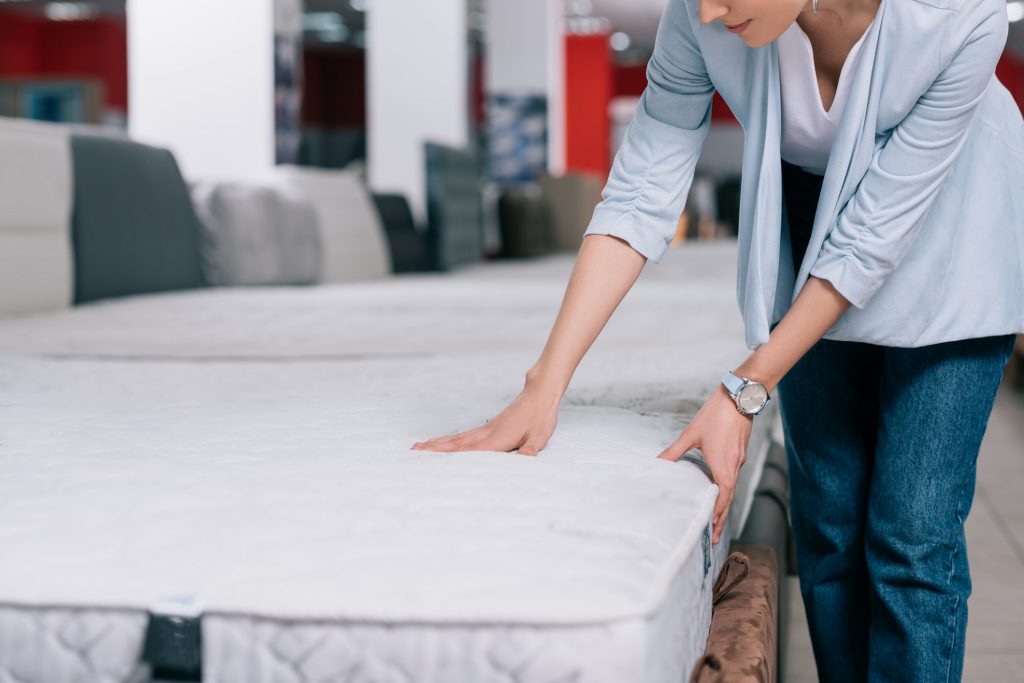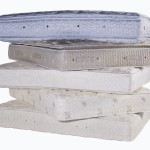
How To Understand Mattress Firmness?
Have you ever spent the night in a friend’s guest room on their ‘very hard bed’, tossing and turning on a mattress that was far too soft? Does your partner love to curl up on the couch, while you just feel like you’re going to sink in between the cushions and never get out? This is because when it comes to firmness, what’s comfortable for one person, and has another tossing like the princess and the pea, varies a lot! Although lumbar and spinal support is important in a bed, finding just the right mattress firmness is a pretty subjective task. To help you find your way in a world of different options, allow us to break down what mattress firmness means, and more importantly, how it feels.

Why are there so many different types of mattress firmness?
Great question! Mattress firmness is so subjective, and there are so many different types because everyone’s body is different, and therefore their preferences. There are also plenty of different materials from which mattresses are made that will affect their firmness; coils and springs provide a different feel to the density of foam core mattresses.
While adults need 7 to 9 hours of sleep a night to properly rest, recuperate and be ready for a new day, half of the population struggles with regular sleep disturbances and has trouble dozing off. Choosing a mattress that is the right level of firmness to both support your body and allow for a comfortable night’s sleep is crucial to getting that all important REM sleep that helps us feel truly rested and refreshed.
What are the benefits of a soft mattress?
Again, what feels like a soft mattress to one person might be very different to another, so ‘soft’ here means soft for you. Soft mattresses feel cosy and warm in cooler weather, they allow the body’s natural curves to feel cushioned, and they offer less resistance than other firmness levels. However, they can be prone to sagging and can make some people feel like they’re stuck in place, making readjusting throughout the night harder.
What are the benefits of a firm mattress?
Firm mattresses offer good durability, being less likely to soften to an unreasonable degree throughout their lifetimes. If you experience lower back or hip pain, firmness can offer resistance which eases discomfort and holds you comfortably when lying down. Firm mattresses can help support people with alignment issues, and often create good ventilation, allowing air to circulate for a cooler night’s sleep.
How do I decide the right mattress firmness for me?
- Soft mattress — If you love the feeling of ‘sinking in’ to your bed after a long day, a soft mattress is probably your idea of heaven. Because there’s plenty of cushioning, side sleepers will often prefer this level of softness, which allows for your shoulders and hips to align comfortably with your neck and torso for a contoured ‘fit’ on the mattress. Soft mattresses have plenty of pillowy material that also makes them good in cold climates.
- Medium mattress — If you’re the easy going type who’s never really thought twice about mattress firmness or why it matters to you, a medium is your best bet. This option gives you the best of both worlds; a soft, pillowy feel, with a little bit of resistance to help you feel supported. If you and your partner have different sleeping styles, a medium mattress will suit side, front and back sleepers well. It’s a versatile option in guest bedrooms for this same reason.
- Firm mattress — If you sleep on your back, or love the springiness of a mattress that seems to help you get up and at ‘em in the morning, a firm mattress is a winner. Firm mattresses hold spines in good alignment and can also help with conditions like arthritis and fibromyalgia. Some people describe them as feeling more traditional and old fashioned. So, if you like a proper good old bed, firmness might be the key.
- Extra firm mattress — For the all or nothing people in the world. If you like to feel lots of push back when you lie down at night, extra firmness is what you’re after. An extra firm mattress is also good for stomach sleepers who may prefer some extra reinforcement around their hips, and for heavier people, as the resistance can feel more supportive.
The difference between mattress firmness and support
We’ve talked a lot about firmness and support here, so it’s worth noting that the two things are actually different. Although people often use the terms interchangeably, they’re not the same! Different mattress firmness levels simply refer to the ‘feel’ of the bed, how much resistance or cushioning you experience when you lay down. Support refers more to the internal structure of the mattress, and deeper levels that will support your core and spine while you sleep. No matter what level of firmness feels right for you, a high quality mattress will still give you the support you need for optimal spine alignment and joint relief.
While any mattress firmness can work as long as it feels right for you, having proper support is essential. Sufficient mattress support can also cut down on partner disturbance, absorbing motion transfer before it reaches your side of the bed, so you can doze on even if your partner is tossing a turning, or gets up in the night.
No matter what your perfect mattress is, find it at Bed Works
Whether you like a super soft marshmallow to sink into at the end of the day, or the pressure relief and resistance of a firm mattress, there’s a mattress to suit everyone at Bed Works. We make it easy to select the perfect mattress for your needs, with easy options to filter for the size, height, comfort level and extra features you want. If you’re shopping for a new mattress for the first time or the old guest bedroom is overdue for an update, find the right bed for every budget in our online selection.





